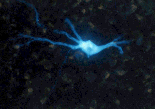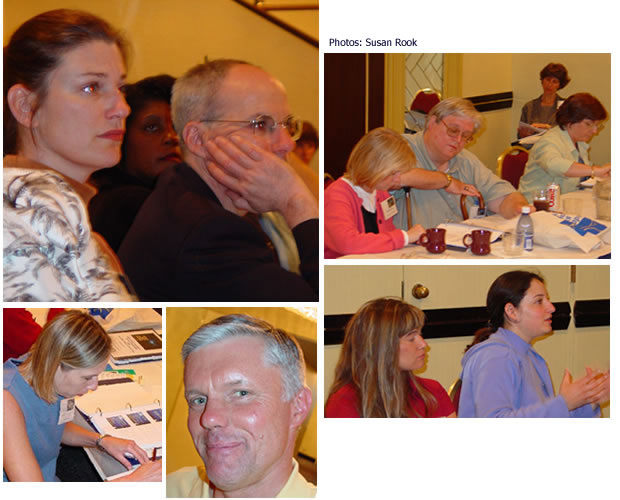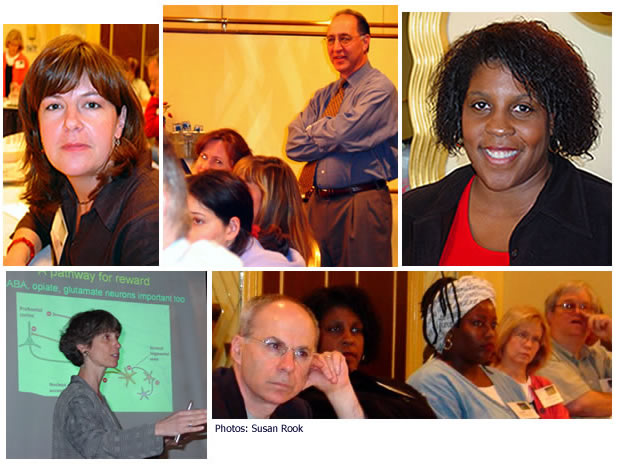

|
|||
|
|
|||
 |
|||
Participants What Journalists Said Faculty Syllabus |
|||
|
|||
| April 2002 Workshop Participants | |||
Jaime Bedrin Reporter WFAE/90.7 FM Charlotte, North Carolina Judy
Boysha Pat
(St. Claire) Desamous Nancy
Imperiale Stacey
Killingsworth Cathy
Koplen Jason
Landers Barry
Meier |
Claudia Pinto Health/Medical Reporter The Daily Progress Charlottesville, Virginia Jenny
Rector Ken
Ripley Lee
Rood Tammy
Smith Mark
Stodghill Pat
Sullivan Charles
Whisenant |
||
 |
|||
What Journalists Said About the April 2002 Workshop |
|||
"I want to thank you again for the great seminar. When I filled out the survey last week, I don't think it had sunk in exactly how much I learned. Since I have been back and have talked to other reporters, editors and people on my beat, I realize just how much I got out of the program. I am currently developing two stories out of the material." "I had a great time in Atlanta - really learned a lot of things I didn't know. I really appreciate the invitation and all the hard work you guys did in putting it together. Thanks very much again to you and everyone else connected with the Addiction Studies program for inviting me to the Atlanta program. It was a very valuable experience." "I have a much better understanding of addiction." "I actually learned some things. Very rare for a seminar." "The program has definitely made me examine the way I think about addictions." "Dinner was a great time to hone in on particular questions and prejudices about drugs and addiction." "I had avoided these stories [about drug abuse and addiction] because of my lack of knowledge – I am far more likely to seek out these stories now." "What
I liked most about the program were the website resources, the hand-out
material, and the fact that it has already provided me with about 6
story ideas." "The thing I liked the most was learning about the physical reactions/actions of the brain when exposed to different substances." "Keep doing what you are doing. I learned a lot and believe the program will prove very valuable in my work. Thanks for the invitation" "Thank you for thinking of journalists. It’s always helpful when we can learn of our past mistakes/misinterpretations so that we can do a more thorough job in the future. Also, thanks for being generous with your contact information. I hope to put it to use." "Knowledge helps promote understanding. I saw drug addiction as a black and white issue before this conference. Drug addicts were law breakers. They chose to break the law. I now believe it’s a gray area. Some people’s brains are changed. I shouldn’t be so harshly judgmental." "The
program provides more sources for me. It has shown me there is a lot
more I can add to every story." |
"What I liked best about the program is the information – I learned things about addiction that I didn’t know." "Keep up the great work. I hope some day there is a Part 2." "Thank you for inviting me – and for putting up with my questions!" "Great resource! Nice Power Point presentation – gives good context." "An eye-opening lecture, courageous!" "The program sparked my interest. I’m leaving with several story ideas and a better understanding of addiction." "Interesting and informative." "Good primer. Easy to understand." "I am very happy I came." "I very much enjoyed the sense of openness and willingness of all participants to be available to assist with future stories and research." "I think now I will look for stories I wouldn’t have, and in reporting on addiction/crime stories I’ll have better ways to approach them." "I discovered many story ideas to pursue and sources for information here." "I liked the technical explanations about what happens to a person who becomes addicted, and I think I have a much improved understanding of it." "Great
faculty!" "This was the best presentation of the day. He clearly explained what happens in the body. He was able to take a complicated topic and make it understandable for a regular person." "I feel much more informed. Enabling me to understand some of the more technical [scientific] jargon will certainly make it easier to paraphrase for the general public." "I now have a better understanding of the role of genetics and environment; better sources, and information."
|
||
April 2002 Workshop Faculty |
|||
|
David Friedman, Ph.D. Director Addiction Studies Program for Journalists Director Center for the Integration of Substance Abuse Research Department of Physiology and Pharmacology Wake Forest University School of Medicine Winston-Salem, North Carolina Sue
Rusche Lawrence
S. Brown, Jr., M.D., MPH, FASAM Marc
Galanter, M.D. Douglas
B. Marlowe, J.D., Ph.D. Susan
Rook |
Rochelle “Shelly” Schwartz-Bloom, Ph.D. Associate Professor of Pharmacology Duke University Medical Center Department of Pharmacology & Cancer Biology Durham, North Carolina Jack
Strandhoy, Ph.D. Frank
Vocci, Ph.D. Kent
E. Vrana, Ph.D. Mark
Wright Marilyn
Yates |
||
| April 2002 Workshop Syllabus |
|||
Wednesday, April 2002 9:00
Introduction 9:15
Animal Models of Addiction 9:30
Shaping the Discussion 10:00
A History of Addiction in America 11:00 Break 11:15
Lecture/Discussion 1:00 Lunch 2:00
Lecture/Discussion 3:45 Break 4:00
Scientifically Reliable Web Sources 5:00 Adjourn 6:00
Reception 7:00
Dinner |
Thursday, April 25, 2002 8:45 Reviewing the Discussion 9:00 Lecture/Discussion 10:45 Break 11:00 Lecture/Discussion 12:45 Lunch 2:00 Lecture/Discussion 3:30 Break 3:45 How Can ASAM Help Journalists Introduction of ASAM Mentors 4:30 Evaluations 5:00 Adjourn |
||
| Home | Register | Future Workshops | Past Workshops | Addiction Stories | Science Update | Links | Glossary | About |
Last Revision
info@addictionstudies.org